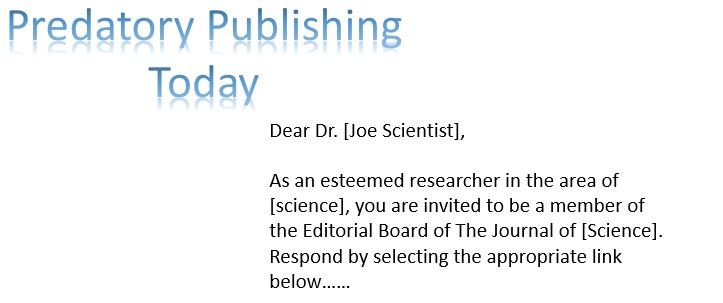I have recently interacted with early career and late stage scientists who have had problems with predatory journals or journals with low requirements for members of their editorial boards. I advised each of these scientists and thought I would share that advice here.
For an early career scientist, I first explained the typical roles of a board member and the rationale for selecting board members and manuscript reviewers. The responsibilities of most academic editorial boards are (i) to provide an initial assessment of submitted manuscripts for quality and appropriateness for the journal and (ii) to manage the peer review process. Most reputable journals want researchers with an established publication record in the topic area of the journal. If you have only a single publication or even fewer than 5 in a particular area relevant to the journal, then your record should be too limited for most reputable journals to consider you appropriate as an editorial board member.
The first task of providing an initial evaluation of a submitted paper requires experience in evaluating the research of other scientists. Most researchers who have recently received a PhD or doctorate degree will not yet have experience evaluating the research of other scientists. Furthermore, they will not often have the necessary breadth of knowledge required to provide a rapid evaluation of the scientific merit or deficiencies of the paper. The second task requires the ability to identify appropriate in-depth reviewers. Again, most scientists who have received their PhD within the past 2-5 years are unlikely to know a field of research with sufficient breadth and have the necessary experience to manage the in-depth review process. Finally, part of managing the review process involves reading and evaluating the comments provided by the reviewer. This also requires experience as an author receiving reviewer comments, knowledge of the area of research, and experience as an in-depth reviewer. Without such expertise, it will be difficult to properly evaluate the comments, guide the authors, and make a recommendation about whether the manuscript should be pended for revision, rejected, or accepted without revision.
So, if a journal is inviting you as an early career scientist with a limited publication record to serve on the editorial board, I recommend not responding or declining. The journal is not likely to have high standards for evaluating manuscripts, and your reputation will not benefit from participating. Your time is better spent performing your research, learning new techniques, building your professional network, and working on grants and manuscripts for publication. As your reputation and publication record grows, reputable journals will invite you to review submissions. Eventually, a journal in your field that you know or a new journal in your field from a publisher that you respect may approach you to join the board. That is the time to consider saying yes.
For the late career scientist, before agreeing to participate as a member of an editorial board for a journal, take the time to research the journal. If you have never heard of the journal, submitted to the journal, or do not read the journal, then it may be better to decline the invitation or even not to respond. If you look up the journal and find that it is one in your field, then take the time to review the journal’s editorial policies and read some of the recently published papers in your area of expertise. Think about if the papers meet your personal standards for scientific quality. Those that are published are the best submissions the journal is receiving. Do you want to evaluate submissions like these or ones that are not even as high in quality?
Another reason a journal invites senior researchers to serve on the board is to lend credibility to the journal. Think about if you are comfortable having your name and information associated with the journal. If the journal is not one that you read and know well, but you are interested in joining as a board member, inquire about the term of service or the process for discontinuing as a board member. Ensure that you have an exit path if you agree to be on the board and later want to retire from the board. Make sure that any questions you have are answered promptly and that you have a clear line of communication with the journal, especially the Editor-in-Chief.
Serving as an academic editor for a journal is an honor, but only if that journal is a reputable one. It is a great way to see what science is being done in your field, but it can also be a time-consuming task to do well, depending on the volume of submissions and the tasks the journal is requesting that you perform as an editor. Given how busy most scientists are, it is important to take a little time to ensure that the invitation you have received is from a journal that is reputable and that you will benefit from the experience as you contribute to the critical scientific endeavor of scholarly publishing.
For additional information about predatory journals, which are the ones that should definitely be avoided, see the following resources and consult with your institution’s librarians:
List of Predatory Journals. Stop Predatory Journals (accessed 4 February 2019) https://predatoryjournals.com/journals/
S. Boucherie, “Predatory” vs. trustworth journals: What do they mean for the integrity of science? Elsevier Connect (15 August 2018) https://www.elsevier.com/connect/predatory-vs-trustworthy-journals-what-do-they-mean-for-the-integrity-of-science
L. Gordon, What Is Predatory/Deceptive Publishing? Thomas Jefferson University, Jefferson Libraries (accessed on 09 February 2022) https://jefflibraries.libguides.com/JournalEvaluation/AuthorImpact/PredatoryPublishing
M. N. O’Donnell, Understanding Predatory Publishers. University Library, Iowa State University (11 September 2018) http://instr.iastate.libguides.com/predatory/intro
For more tips and insights about scientific communication and scholarly publishing: https://www.bioserendipity.com/category/scientific-communication/

